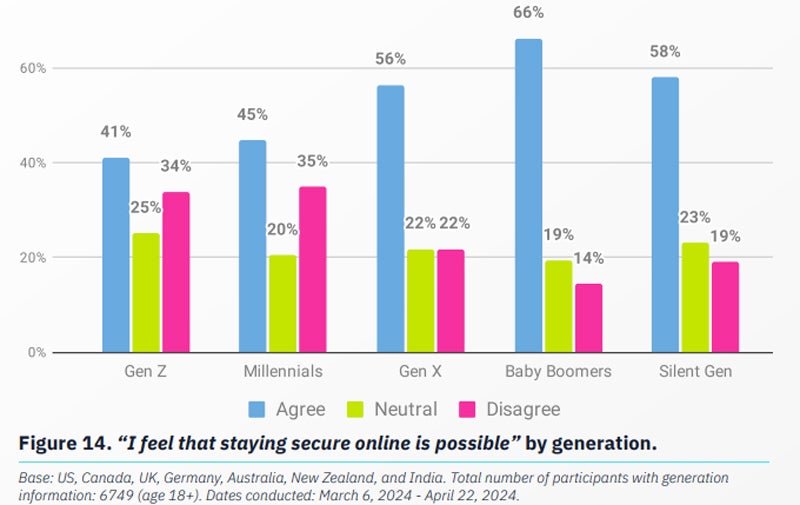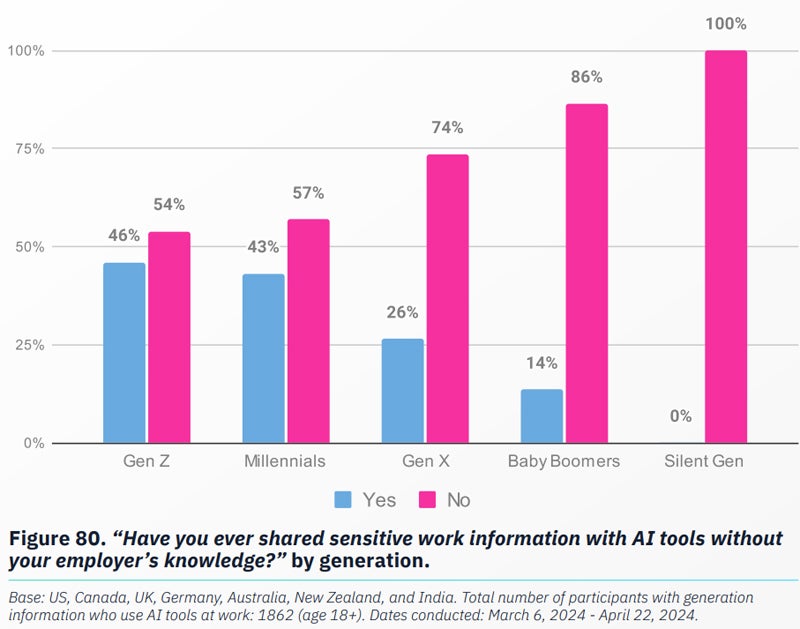
The latest Annual Cybersecurity Attitudes and Behaviours Report, released by the Australian Cyber Collaboration Centre in Australia, has revealed both Australian and global workforces are exhibiting various concerning cybersecurity behaviours, including significant tendency to share company data with AI tools.
Surveying 6,500 individuals of varying ages in eight countries, including Australia and New Zealand, the report found IT and cybersecurity leaders are making headway toward improving security with cybersecurity training. However, they are still battling a number of poor cybersecurity attitudes and behaviours in their workforces.
The report found that Australians, like others around the world, are increasingly frustrated by the need for constant online cybersecurity measures. In an Australian cybersecurity environment that has included pervasive digitisation of business and services, as well as a large number of data breaches:
The results suggest a rising discontent with the downsides of the digital environment in which individuals work. The complexities and friction of navigating cybersecurity to minimise risks could be causing disengagement with security practices, which could be a threat to employer data security measures.
SEE: APAC employees are choosing convenience, speed over cybersecurity
Individuals increasingly expect others to be responsible for the security of their information, including the tech industry and tech platforms. In Australia, 90% of participants across all age groups believe that apps and platforms should be responsible for protecting their personal information. In addition:
Premium: How to create a cybersecurity awareness program
“Complacency and frustration are dangerous combinations in the fight against cybercrime in Australia,” Matthew Salier, chief executive officer at the Australian Cyber Collaboration Centre, said in a statement. “Vulnerability to cyber-attacks is of particular concern across younger generations because they’re not taking adequate precautions, relying too heavily on others or assuming their devices are secure.”
The report found individuals still trip up on cybersecurity hygiene, which could impact employers:
Password usage: The use of personal information for passwords, such as family members or pet names, rose across all generations, with Gen Z the group most likely to use these passwords (52%). Organisations should take note that the most preferred method for managing passwords among those with more than one online account is to write them down in a physical notebook (29%), while just 12% use a password manager.
Multi-factor authentication: A huge 81% of respondents have heard of MFA, up 11% on last year, which should help cybersecurity pros implementing the technology. However, adoption is inconsistent. The report found MMA adoption could be frustrating for the user experience, with many younger users who have tried to implement MFA in the past on their devices having since abandoned it.
Phishing detection: The survey participants were on the whole ready to recognise phishing emails or malicious links, with 67% across geographies saying they felt confident they could do so. However, 10% of respondents said they were not confident; analysis in the report suggested this was because of the increasing sophistication of phishing attempts, including criminals using AI.
Artificial intelligence tools are creating new cybersecurity and data security issues in the workplace:

There is evidence individuals may have low trust in the ability of organisations and IT to implement AI:
Academy: Skill up with our very own 2024 cybersecurity mastermind training bundle
There are some global concerns that AI will impact jobs. Almost half of Gen Z (48%) and Millennials (49%) felt it was likely AI will cause changes to their employment status, though the Baby Boomers and Silent Generation were less concerned about the impact of AI on their work (13% and 11%, respectively).
Despite the report revealing some concerning cybersecurity behaviours, IT and cybersecurity professionals have been given an indication the cybersecurity training programs they have rolled out appear to be increasing cybersecurity awareness among individuals who are their employees:
“As the threat landscape evolves with the introduction of AI,” Salier concluded, “we must equip individuals and organisations in Australia with the tools they need to navigate this complex environment.”